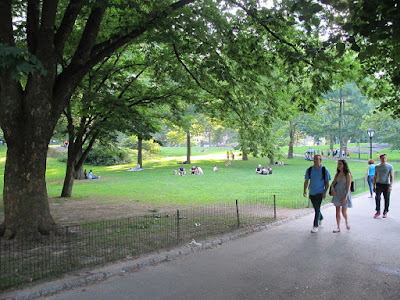I did not know Central Park was so beautiful. Especially on a 90-plus-degree day, when the heat and brightness seem to overexpose patches of the world like 35-millimeter film. The large rocks are like the backs of dinosaurs buried in the earth. The foliage is ample, and the waterway that I saw, still and green, looks primeval. And of course there are people: so many people enjoying themselves. I remember how well cars and CDs went together; let me tell you, colored t-shirts on humans amidst huge rocks, green hills, paved paths, and occasional kiosks, comfort stations, and playgrounds are just as good a fit. I’ve lived in New York for most of the past 13 years, but I’ve rarely just come and spent time here.
I realize that the
park’s splendor is not a news item. But for me, it was a revelation. If you
pack a lunch and a book, or visit the Strand’s open-air store near 60th Street
and 5th Avenue if you forget one, you’ll have everything you need. There’s
plenty of shade, and the hills are comfortable to lie on.
Browsing at the
Strand three days ago, I found a copy of Sex
at Dawn, which a fellow temp recommended three summers ago. I opened it, read
a little about the sexual customs of the Mosuo, a people in China, and thought this
is the book for me. The preface is extraordinary: it describes how one of the
authors confronted a charging monkey in Malaysia by baring his teeth, extending
his arms, crouching his legs, and screaming. The monkey backed off, and the
author learned that he was a primate, too. I felt human while reading about it on
a hillside in the park.
At some point, I
thought about how for so many years I could not get past the allure of McCarren
Park when I lived in Greenpoint. Discovering Central Park now is probably due
to the fact that I’m fully employed as a teacher and on summer break. I’m more
confident now than I was then, when I thought a lot about dreams and desires,
didn’t act on them enough, and couldn’t bring myself to make the crushing and
regenerative compromises that come with adulthood. I’ve also signed up for a daily French class at the Alliance Française, also on 60th Street, that finishes at 1
every day. Monday was the first class, and it felt so right.
Oh yeah: I even heard
the chorus of Lou Reed’s “Perfect Day,” a song that always makes me picture a scene
in Central Park, in my head when I walked down the steps into the subway at
Columbus Circle. Sure, I then remembered that the next line is “you’re going to
reap just what you sow,” but so far, summer is a good harvest.



